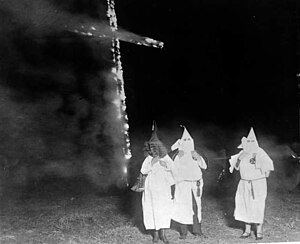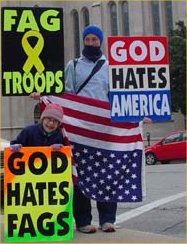Anti-homosexualism
This article needs additional citations for verification. |
Anti-homosexualism
Anti-homosexualism (alternatively spelled antihomosexualism) is the political targeting of homosexuals for attack or opposition by a political or religious group.[citation needed] The Ku Klux Klan and the World War II German Nazi party are two examples of groups that have expressed anti-homosexual views or engaged in anti-homosexual acts in the past.
Examples of Anti-homosexualism
Nazi Germany
Gay men and, to a lesser extent, lesbians, were two of several groups targeted by Nazis during the Holocaust.
Prior to the Third Reich, Berlin was considered a liberal city, with many gay bars, nightclubs and cabarets. Berlin also had the most active LGBT rights movements in the world at the time. Doctor Magnus Hirschfeld had co-founded the Scientific-Humanitarian Committee (Wissenschaftlich-humanitäres Komitee, WhK) in Berlin in 1897 to campaign against the notorious "Paragraph 175" law that made sex between men illegal. It also sought social recognition of homosexual men and women. It was the first public gay rights organization.
In 1919, Hirschfeld had also co-founded the Institut für Sexualwissenschaft (Institute for Sex Research), a private sexology research institute. It had a research library and a large archive, and included a marriage and sex counseling office. In addition, the institute was a pioneer worldwide in the call for civil rights and social acceptance for homosexual people.
The advancements of the gay community were soon erased, however, with the coming to power of Hitler's Nazi Party. Nazism declared itself incompatible with homosexuality, because homosexuals did not reproduce and perpetuate the master race. Hitler believed that homosexuality was "degenerate behavior" which posed a threat to the capacity of the state and the "masculine character" of the nation. Gay men were denounced as "enemies of the state" and charged with "corrupting" public morality and posing a threat to the German birthrate.
Nazi leaders such as Himmler also viewed homosexuals as a separate people and had Nazi doctors experiment on them in an effort to locate the hereditary weakness many party members believed caused homosexuality.
Some leaders clearly wanted gays exterminated, while others wanted enforcement of laws banning sex between gay men or lesbians.
In late February 1933 the Nazi Party launched its purge of homosexual (gay, lesbian, and bisexual; then known as homophile) clubs in Berlin, outlawed sex publications, and banned organized gay groups. As a consequence, many fled Germany (e.g. Erika Mann, Richard Plaut). In March 1933, Kurt Hiller, the main organizer of Magnus Hirschfeld's Institute of Sex Research, was sent to a concentration camp.
On May 6, 1933, Nazi Youth of the Deutsche Studentenschaft made an organised attack on the Institute of Sex Research. A few days later the Institute's library and archives were publicly hauled out and burned in the streets of the Opernplatz. Around 20,000 books and journals, and 5,000 images, were destroyed. Also seized were the Institute's extensive lists of names and addresses of LGBT people. In the midst of the burning, Joseph Goebbels gave a political speech to a crowd of around 40,000 people.
After solidifying his power, Hitler would include gay men among those sent to concentration camps during the Holocaust. Heinrich Himmler would then became very active in the suppression of homosexuality. He exclaimed, "We must exterminate these people root and branch... the homosexual must be eliminated." (Plant, 1986, p. 99).
Shortly after the purge in 1934, a special division of the Gestapo was instituted to compile lists of gay individuals. In 1936, Heinrich Himmler, Chief of the SS, created the "Reich Central Office for the Combating of Homosexuality and Abortion."
Estimates vary wildly as to the number of gay men killed in concentration camps during the Holocaust ranging from 15,000 to 600,000. The deaths of at least an estimated 15,000 gay men in concentration camps were officially documented. Larger numbers include those who were Jewish and gay, or even Jewish, gay and communist. In addition, records as to the specific reasons for internment are non-existent in many areas, making it hard to put an exact number on just how many gay men perished in death camps. See pink triangle.
The persecution of homosexuals as part of the Holocaust has seen increasing scholarly attention since the 1990s.
Ku Klux Klan

The Ku Klux Klan has a long history of anti-homosexualism and has described homosexuality as; "a perversion of nature and a filthy, diseased and perverted lifestyle." [1]
This section needs expansion. You can help by adding to it. |
Westboro Baptist Church
Members of the Westboro Baptist Church identify themselves as Baptists; but the church is an independent Baptist church not affiliated with any known Baptist conventions or associations. The church describes itself as following Primitive Baptist and Calvinist principles, though it has been accused by others of Hyper-Calvinism. [2]

The church bases much of its work around the belief that "God hates fags" (its best known slogan and the address of its primary website) and expresses the opinion, based on its Biblical exegesis, that nearly every tragedy in the world is linked to homosexuality (specifically society's increasing tolerance and acceptance of gay, lesbian, and bisexual people). It believes God hates homosexuals above all other kinds of "sinners" [3] and that homosexuality should be criminalized, punishable by the death penalty. [4]
Islamic nations
Homosexual intercourse officially carries the death penalty in six Muslim nations: Saudi Arabia, Iran, Mauritania, Sudan, Somalia and Yemen.[2] It formerly carried the death penalty in Afghanistan under the Taliban. The legal situation in the United Arab Emirates is unclear. In many Muslim nations, such as Bahrain, Qatar, Algeria, and the Maldives, homosexuality is punished with jail time, fines, or corporal punishment. In some Muslim-majority nations, such as Turkey, Jordan, Egypt, or Mali, same-sex intercourse is not specifically forbidden by law. In Egypt openly gay men have been prosecuted under general public morality laws.(See Cairo 52.)

In Saudi Arabia, the maximum punishment for homosexuality is public execution, but the government will use other punishments -- e.g., fines, jail time, and whipping -- as alternatives, unless it feels that homosexuals are challenging state authority by engaging in LGBT social movements. [3] Iran is perhaps the nation to execute the largest number of its citizens for homosexuality. Since the 1979 Islamic revolution in Iran, the Iranian government has executed more than 4000 people charged with homosexual acts. In Afghanistan after the fall of the Taliban homosexuality went from a capital crime to one that it punished with fines and prison sentence. (See also:Homosexuality and Islam)
Usage
Anti-homosexualism is a calculated political philosophy used by many historical and modern groups.[citation needed] It is not necessarily associated with homophobia, a fear of homosexuals or homosexuality.[citation needed]
References
- Historic gay and lesbian rights speech given by Albert Ellis on January 26, 1957. "How Homosexuals Can Combat Anti-Homosexualism" [4]
- Anti-homosexualism is in great part caused by anti-sexualism." - Jack Nichols, Greenwich Village Gazette NY, 2000 [5]
- "Hostility toward gay people has been labeled...anti-homosexualism (Hacker, 1971). The most widely used summary label for [this attitude] is homophobia (Smith, 1971; Weinberg, 1972). Aside from its linguistic awkwardness (its literal meaning is “fear of sameness”), the term “homophobia” reflects at least three assumptions: That antigay prejudice is primarily a fear response; that it is irrational and dysfunctional for individuals who manifest it; and that it is primarily an individual aberration rather than a reflection of cultural values. Empirical data do not support these assumptions (Fyfe, 1983; Herek, 1986c; Nungesser, 1983)." - "Stigma, Prejudice, and Violence Against Lesbians and Gay Men", Gregory M. Herek, Department of Psychology, University of California at Davis - In John C. Gonsiorek & James D. Weinrich (Eds.) (1991), Homosexuality: Research implications for public policy (pp. 60-80). Newbury Park, CA: Sage. [6]
- George Chauncey, Professor of History and Director of the Lesbian and Gay Studies Project at the University of Chicago. is the author of Gay New York: Gender, Urban Culture, and the Making of the Gay Male World, 1890-1940, and the co-editor of Hidden From History and Thinking Sexuality Transnationally. "He is currently completing a book on the racially segregated and class stratified gay male worlds and sexual cultures of postwar New York City, the sources of postwar anti-homosexualism, and the development of gay politics." [7]
- Nancy Travis Wolfe is a Distinguished Professor Emeritus of Criminal Justice at the University of South Carolina and received her Ph.D. in American Constitutional History from the University of Delaware. She has written extensively in the area of comparative criminal justice, as well as corrections and other topics. Her work has been published in Comparative Criminology, Victimology, Federal Probation, and the Journal of Criminal Justice. [8] In her book Policing a Socialist Society. The German Democratic Republic, Wolfe states: "Extremism on both ends of the political spectrum, though never acknowledged by the Honecker government, had been growing since the early 1980s. Cessation of the prosecution of dissenters, opening of the border, and the volatile political situation in the postrevolutionary period provided fertile ground for antisocial activity by a variety of groups. Among them were punks, skinheads, soccer rowdies, fascists (Faschos), and neo-Nazis, exposing a mixture of xenophobia, anti-Semitism, racism, rightist totalitarianism, antiestablishmentism, antihomosexualism, and so on." [5]
Footnotes
- ^ The White Camelia Knights of the Ku Klux Klan website [1]
- ^ "Does God Hate Homosexuals" Mars Hill Forum #70, Casper Open Bible Church, Casper, Wyoming, October 13, 2002
- ^ "Westboro Baptist Church FAQ"
- ^ Outlaw Sodomy Flier
- ^ 1992 book quote taken from Police & Society, 2003, Issue No. 7, pg. 190 (an official publication of the Israel National Police) http://www.police.gov.il/pdf/police_society/77.pdf
